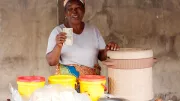Recent Blogs
Blog
Facing Climate Events in Nigeria, Farmers Left With Scarce Options
Based on interviews with hundreds of farmers in Nigeria, we unpack how households use financial services in responding to climate events.Blog
Maximizing the Impact of Financial Inclusion for Young Women
Among which segments of young women could investments in improved financial services make the most impact? We highlight findings from a recent CGAP segmentation exercise.Blog
BNPL in Nigeria: Emerging Fintech Innovations for MSEs
Findings from our recent research suggest BNPL is becoming a significant lending mechanism for Nigerians – especially for micro, small and medium enterprises and self-employed individuals who would not otherwise have access to credit.Blog
Can Open Banking Support Financial Inclusion in Nigeria or Elsewhere?
Open banking initiatives must be well designed to deliver the benefits they promise consumers and financial service providers - Nigeria’s framework offers a look at both the opportunities and potential pitfalls of implementing such a scheme.Blog
We Agree – Life Stages Likely Impact DFS Usage Among Young Women
Certain life stages have a significant impact on women’s economic empowerment and use of financial services - particularly for young women.Blog
How Paystack’s APIs Are Enabling Entrepreneurs in Nigeria
Paystack's open APIs for digital payments are helping thousands of African companies to launch new business models and deepen customer relationships.Blog
African Digital Credit Goes West
Digital credit is emerging in West Africa. Despite early reports of low default rates, consumer protection policies will be key to avoiding problems witnessed in East Africa.Blog
Where Youth Join Trust Groups, Not Insurgency Groups
By providing a combination of financial and nonfinancial services to over 16,000 smallholders, a social enterprise in northern Nigeria is harnessing the power of agriculture to create jobs for youth and improve livelihoods.Blog
Client Registration: The Blind Spot in Agricultural Insurance
This agricultural insurance provider tripled its product registration rates in rural Nigeria by improving its registration process.Blog
Mapping Africa’s Latest Innovations in Digital Finance
CGAP received nearly 200 proposals from digital financial services providers across Africa interested in piloting new products. A look at those proposals — from 30 countries — shows that innovations are spreading beyond hot spots like Kenya.Blog
Paying for School: 6 Insights for Better Financial Services
The inability to pay fees and other education expenses keeps many children out of school. What is the extent of these challenges, who is affected and what kinds of financial services could help?Blog
Enhancing Financial Inclusion for Women in Nigeria
Even though Nigeria has a higher level of financial inclusion than Sub-Saharan Africa across three of five indicators, the gender gap in Nigeria is higher. What can be done to lower the barriers to female financial inclusion?Blog
Cashless Nigeria: Facilitating the Transition to Digital Payments
The Better than Cash Alliance released two studies covering Nigeria's journey from cash to digital payments. Digital payments are passing a tipping point in Nigeria's corporate sector, with 61% of salaries from large companies paid electronically.Blog
Bringing Mobile Wallets to Nigerian Farmers
Cellulant developed a mobile wallet network in Nigeria that extends to some eight million farmers. With more than 40 million transactions in just two years, smallholder farmers in Nigeria are poised to adopt digital financial services more broadly.Blog
Savers Deserve More Attention and Protection
Access to finance in the West African Economic Monetary Union and Economic and Monetary Community of Central Africa grew significantly from 2001 to 2011. However, more attention must be paid to savings and savers.Blog
Banking on Including Women in Nigeria
In Nigeria, Diamond Bank is using customer insights to design and market a new savings product for women.Blog
Mobile Money: Even Data Analytics Has Limitations
While quantitative data analysis is a useful first step in understanding active mobile customers, it is even more insightful when providers actually go and talk with their customers directly.Blog
From Diagnostic to Action: Developing Microinsurance in Nigeria
A Microinsurance Country Diagnostic in Nigeria revealed that while there is a huge opportunity for the development of a microinsurance market, low-income people in the country have limited knowledge of insurance and the value it can deliver.Blog
Nigeria Targets Real Financial Inclusion
In 2012, the Nigerian government set formal targets for financial inclusion and aims to bring down financial exclusion to 20% by 2020.Blog




















